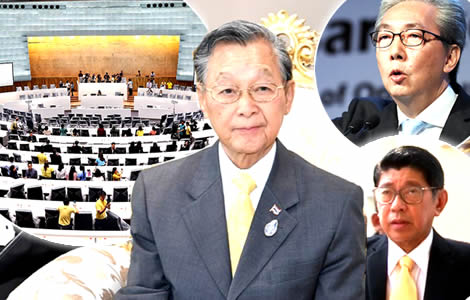Deputy Prime Minister Somkid Jatusripitak has expressed concern at the development but says officials are ready to respond to keep the economy primed in this challenging economic environment. Both sides of the house are calling for clarification from the Constitutional Court on the concerns raised.
The Speaker of the House of Representatives has received a report into allegations of voting irregularities during the passage of the ฿3.2 trillion government spending bill which are threatening to impede the prospects of the bill becoming law over the next week as groups of opposition and government coalition MPs call for the matter to be clarified.

A legal quagmire has opened up surrounding the government’s massive ฿3.2 trillion budget bill which ministers had been counting on sending on for royal endorsement this week.
It follows claims from a former Democrat Party MP, Mr Nipit Intarasombat, that two Bhumjaithai MPs voted on the bill as it made its way through the House of Representatives but were not physically present in the chamber.
Fears the bill may meet the same fate as the 2013 measure passed while Yingluck was prime minister
The revelation has prompted alarm that the outcome could be the same as in 2013 when the government of Yingluck Shinawatra suffered a setback when it’s ฿2 trillion budget bill was thrown out by the Constitutional Court after it found that several Pheu Thai MPs had cast votes on behalf of colleagues who were not in the parliamentary chamber at the time.
Deputy PM Sonkid expresses concern
On Thursday, Deputy Prime Minister Somkid Jatusripitak expressed his concern that any delay to the current bill would adversely affect the Thai economy which in 2020 is reliant on government expenditure and stimulus to keep its momentum moving forward.
The government’s economic chief said that finance ministry officials and executives in state firms were preparing measures to deal with any possible eventuality including the demise of the bill.
His ministerial colleague, Deputy Prime Minister Wissanu Krea-ngam, was more sanguine about the situation. The government’s legal expert is confident that the current situation can be resolved without too much damage.
Speaker of the House receives a report on the votes
It comes as the Speaker of the House Chuan Leekpai has revealed that he had already received a report on the claims from Sorasak Pienvej the secretary-general to the House of Representatives.
Status of the bill must be clarified
The speaker has warned that the status of the bill will have to be clarified by the house before it can be sent for royal endorsement.
The bill was passed by the Senate on Tuesday and was due this week to be sent to the prime minister’s office who has five days to send it for royal endorsement.
Former Democrat MP identified a Bhumjaithai MP from Phatthalung as not being present for the vote
The former Democrat Party MP Mr Nipit claims that Chalong Therdwirapong, a Bhmjaithai MP for Phatthalung, was not present in the chamber on January 10th when his vote was cast on the bill.
This has been confirmed by Mr Chalong who said he left that day for a funeral in his home province but left his voting card behind.
Another Bhumjaithai MP was at Suvarnabhumi airport flying to China at the time of the vote
The eagle-eyed former MP has also revealed that Bhumjaithai MP Natee Ratchakitprakarn was not present in the chamber when the bill was voted on.
He has produced photographic evidence that the Bhumjaithai Party MP was at Suvarnabhumi Airport as she prepared to travel to China when the vote was taking place in the lower house this month.
Both sides of the house seek legal clarification
The concerns about the bill’s constitutional validity have prompted submissions to the Speaker of the House of Representatives from both sides of the house.
90 coalition MPs have asked for clarification from the court on the status of the bill and also whether the whole bill falls or alternatively, the portions voted upon by the members who were not present.
84 opposition party MPs simply wish to have the constitutional validity of the bill tested.
Bill to be tested under the 2017 constitution
Another important factor in the legal conundrum may also be Section 143 of the constitution which stipulates that if a bill is presented to the house and not voted on or determined within 105 days, it is automatically adjudged to have passed.
It must be noted the 2013 decision to invalidate the budget bill was adjudicated under the 2007 constitution whereas this issue is subject to 2017 constitution which specifies under Section 120 that every MP has one vote in the house.
Further reading:
Opposition will not put the ฿3.3 trillion 2020 budget bill in danger but plans to scrutinise it
Thai Economic team fights back with ฿370 billion stimulus aimed at achieving 3% growth this year


















